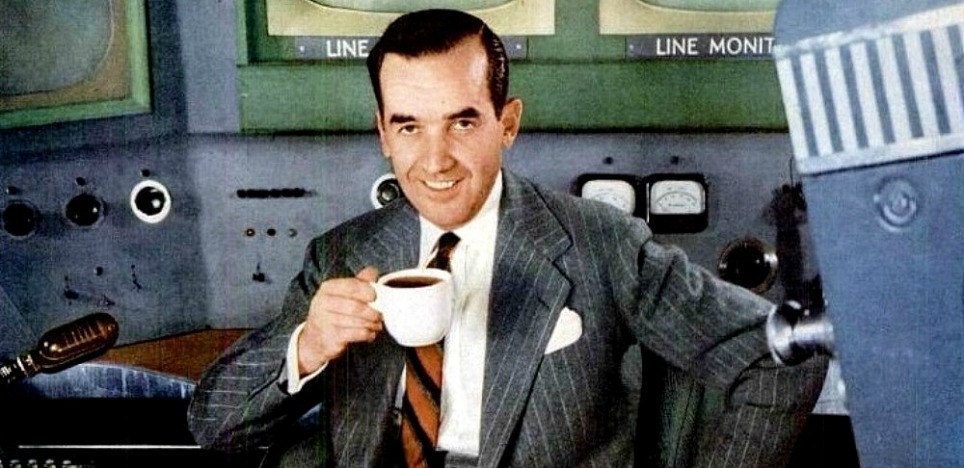Edward R. Murrow, the widely heralded television journalist, news anchor, and radio publisher, was born on this day in 1908; he died in 1965 after a long and lauded career.
Murrow was hired in 1935 by CBS as a Director of Talks and Education, a job that involved developing cultural and discussion shows. While working in Europe, he put together a team of reporters, who became known as "Murrow's Boys"; they offered first-hand accounts of what was happening during World War II. Reporting from London, he began to use a phrase commonly said during the blitz when people did not know what the evening would bring: "Good night, and good luck." This became his signature sign-off.
After the war, Murrow returned to New York and served as a Vice President of CBS News. But his heart was in programming and he soon developed a series of shows to give voice to people's interests and concerns. In one of his "See It Now" programs, he presented a scathing attack on the fear-mongering tactics of Senator Joseph McCarthy; many cultural critics point to this moment as the beginning of the waning of the Red Scare in America.
Murrow was selected as the head of the United States Information Agency by President John F. Kennedy in 1961. He was awarded the Presidential Medal of Freedom in 1964 and an honorary knighthood by the British government in 1965.
To Name This Day:
 Film
Film
* Watch the DVD of Good Night, and Good Luck, a stirring tribute to Edward R. Murrow directed by George Clooney. Spirituality & Practice chose it as one of the Most Spiritually Literate Films of 2005. David Strathairn portrays the pioneering broadcaster during the period from 1953 to 1954 when he took on Senator Joseph McCarthy and the House Un-American Activities Committee's communist witch-hunt. After McCarthy labeled him a Communist sympathizer, Murrow said:
"We will not walk in fear, one of another. We will not be driven by fear into the age of unreason if we dig deep in our history and our doctrine and remember that we are not descended from fearful men, not from men who feared to write, to speak, to associate, and to defend causes that were for the moment unpopular . . . We proclaim ourselves, as indeed we are, the defenders of freedom, wherever it continues to exist in the world, but we cannot defend freedom abroad by deserting it at home."
As you remember Murrow on his birthday, think about the ways this film and his actions speak directly to our times about the need to defend freedom at all costs and to give no quarter to those who operate out of a fear-based perspective.
* See "Films about Journalists," 21 films that reveal the challenges, benefits, and importance of this career. Of the journalists profiled in these feature films and documentaries, who do you most admire as a defender of freedom? What spiritual gifts animate his/her life and work? Which of the films are your emotional favorites? Give reasons for your choices.
 Quotes
Quotes
Ponder these quotes from Edward R. Murrow.
"American traditions and the American ethic require us to be truthful, but the most important reason is that truth is the best propaganda and lies are the worst. To be persuasive we must be believable; to be believable we must be credible; to be credible we must be truthful. It is as simple as that."
"A nation of sheep will beget a government of wolves."
"Our major obligation is to not to mistake slogans for solutions."
"The only thing that counts right now is the right to know, to speak, to think — that, and the sanctity of the courts. Otherwise, it's not America."
"Just once in a while, let us exalt the importance of ideas and information."
 Spiritual Practice
Spiritual Practice
Here is a spiritual practice that brings to mind the courage and fearlessness of Edward R. Murrow. In her book, Awake Mind, Open Heart: The Power of Courage and Dignity in Everyday Life, Cynthia Kneen tells a story about the great Tibetan poet-yogi Milarepa. After trying unsuccessfully to get some demons to leave his cave, he switched gears and invited them to stay for some soup and to talk about the teachings. He showed us that instead of trying to get away from what we fear, we can walk into it, face it, and even befriend it. "The process is like opening a door and going in. The threshold where you were is completely transcended and you find yourself on the other side of fear. You are strengthened and confident." The Tibetan Buddhist teacher Trungpa Rinpoche called this the practice of going in and coming out. Try this the next time you, like Edward R. Murrow, are confronted with a difficult problem you need to both understand and overcome.
